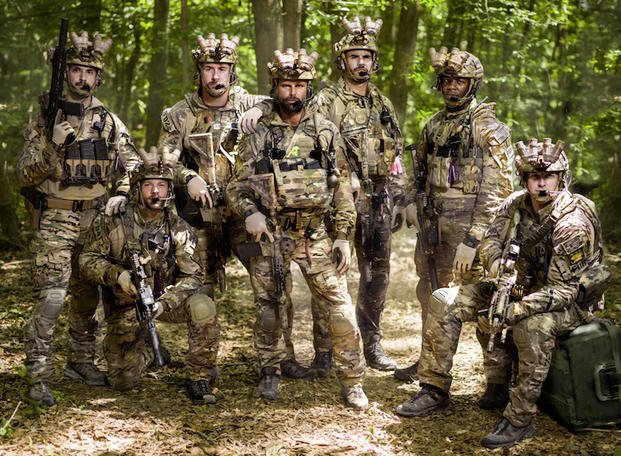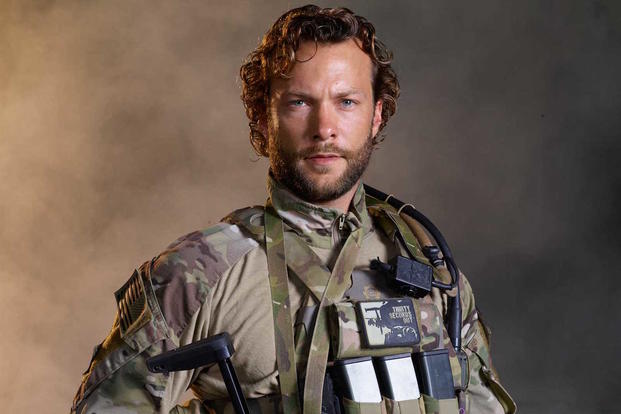SIX is an ambitious new dramatic series from the History Channel that aims to give a glimpse inside Navy SEAL culture, combining the action from their missions with the interpersonal relationships between the team and their families back home. Created by the father/son team of William and David Broyles. William is the screenwriter behind Apollo 13 and Jarhead and David is a special ops veteran.
In season one, former team leader Rip Taggart (Walton Goggins) is taken hostage by Boko Haram while working as a private contractor. The current team leaders (played by Barry Sloane, Juan Pablo Raba and Kyle Schmid) takes on the mission of rescuing Taggart and the schoolchildren kidnaped by the terrorists.
We had a chance to talk with actor Kyle Schmid (Being Human, Copper) about how the cast prepped for the show and what he hopes viewers take away from the series.
Tell me about the training the cast had before you started filming the series.
The training started a day after we met each other. The cast was brought together and had no prep for the training, a prep course for BUD/S called SEALFIT. If you look them up, it comes with a month-long diet of how to prepare for the course. We didn’t have any of that and were thrust into it head first with a bunch of actors, guys kind of wear their heart on your sleeve. You don’t know who the other one is yet and whether they're gonna be an egotistical maniac or a drama queen.
Let's just say this course kicked the shit out of everybody and we left it much better people. It started with 5:30am runs and then log lifts and then water work in a pool just to test everybody's capabilities. And then a 12 mile run down the beach with our 40 pound rucksacks on our back, most of which broke, so we were trying to figure out how to run with those and keep up with our coach or coaches. Then we did surf drills, swimming out to the surf with our surf buddies. That was followed by log lifts again. And then, you know, et cetera, et cetera.
That first night we were woken up with a freezing cold hose to the face. We went down to the beach and did surf exercise again until about 3:00 in the morning and then we got three hours sleep and went into our next day.
After that, we got one decent night's sleep after all the exercise. The following morning, we were up at 5:00 and maintained the mental and physical work and breakdown of our psyches. We eventually got into a 15-20 mile hike. It took six hours with the rucksacks on our backs, 40 pounds in each. We were carrying a 10 pound weight in each hand. We were also doing simulated drills during the evenings, these night ops. Then, just as we were hoping that was gonna be finished at 4AM, we were taken into a van and driven to the beach in March. So I think the water was about 52, 50 degrees. We were freezing, everyone was tired, and we ended up doing forms of surf torture. We practiced teamwork and worked out on the beach until about 9:45 in the morning.
Just as we thought that was over, we had to run back to headquarters and continue doing log lifts, etc. Basically, it was a four day hell week. It's just the tip of the iceberg with what these guys go through and, even just having that little taste, it gave us a ton of respect for them. Ultimately, it built teamwork and brotherhood. There's a big difference when you work with a bunch of actors and you go on the set and you just hope they know their lines. When you go through something like that, it knocks all the ego out of you. You are humble and you are human and you know why you want to be part of this show, because you have to have the utmost respect for who these guys are and what they sacrifice and what they're capable of.
Out of that training, I have six of my best friends now. It's pretty cool to say that I'm closer with these guys than I am with people that I've known for 15 years. I trust them with my life.
The show really focuses on the personal lives of the SEALS and how their home life impacts their work. That’s a different perspective than most Hollywood movies about Specials Ops guys.
I think that comes down to Bill and David Broyles and the integrity that they brought to this project. Both served themselves. They didn’t want to just tell another glamorized war story. They wanted to focus on who these men and women really are. They wanted the audience to see that these were men and women, regular men and women, who made a massive difficult decision to sacrifice so much in their own lives for the greater good of America.
It could be your brother, it could be the guy that pumps gas down the street from you, or a school teacher that found a higher calling. These guys are human, they have families, and the sacrifices that they make out on the battlefield to be part of this incredible organization have repercussions. Those repercussions are things that most movies don’t necessarily ever touch on. It's the wives that are making sacrifices, not just the husband, not just the people who are serving.
It’s really interesting to see the way that they balance the show with some of the great action that’s in it. Our SEAL advisor Mitch Hall was right there on our backs making sure that we were doing our utmost to respect the SEALs that we had worked with. “You better make us look good, because if you don’t I'm walking off this set.” It was pretty intense and there was a lot of pressure there, but it was important to see what happens and how difficult it can be coming home for these guys.

I didn’t have any previous military background and one thing that I've taken away from this show is how difficult it is for SEALs to balance family life with their life in service and how little the government provides to veterans who have sacrificed so much. They haven't been able to talk about it to anyone or don’t have the community they need to support them just doesn’t exist. Hopefully, this show will change some of that world for them when they come home and allow them to have some kind of outlet. Even if it only opens our viewers' eyes to see and respect and say, “Thank you for your service” the next time you see somebody in the kits or uniform. It's too often that we walk past them with our head down or don’t even notice them.
Your character is particularly interesting because his marriage has already blown up.
I think something like 60% of marriages in the SEAL teams fail. I think Caulder's ended for probably a few different reasons. On top of other things, he’s a little bit of a playboy.
But he's also the point man for the team and that means he's the first around the corner and sticks his head out. He's potentially the first person to get it blown off. He is so good at what he does that he's been the point man for years now. And he likes it, he loves living on the edge. He's waiting for that ticket to Valhalla and, if it needs to be punched, he's fine with it because he's managed to protect his brothers day in and day out.
When he joined the military I think it was a means of providing for his family. Coming from a broken home, he was given purpose and he was given a brotherhood and I think he found a father in Rip’s character.
He’s a very complex character. He's the fun guy, but there's a term called "clowning" in the acting community. Under that makeup is sometimes a lot of darkness and sadness. Often, when you don’t know how to communicate your emotions, you just put a smile on your face and throw out the next joke. Caulder is a pretty complex guy and he definitely goes in some different directions throughout this first season, so I'm excited for people to see that.




